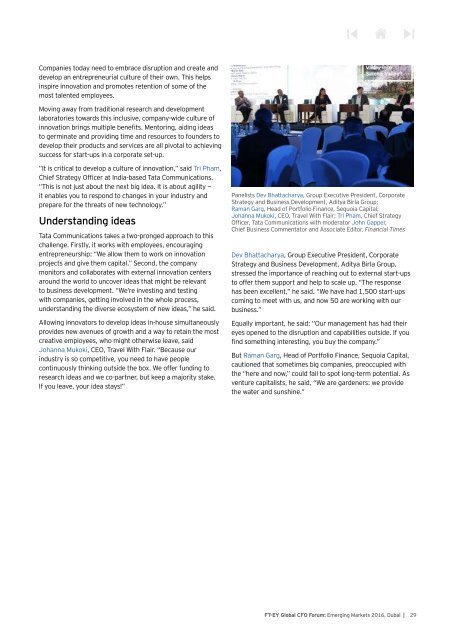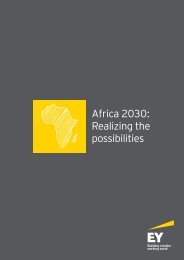FT-EY Global CFO Forum Emerging Markets 2016 Dubai
ft-EY-global-cfo-forum-emerging-markets-2016-dubai-interactive
ft-EY-global-cfo-forum-emerging-markets-2016-dubai-interactive
Create successful ePaper yourself
Turn your PDF publications into a flip-book with our unique Google optimized e-Paper software.
Companies today need to embrace disruption and create and<br />
develop an entrepreneurial culture of their own. This helps<br />
inspire innovation and promotes retention of some of the<br />
most talented employees.<br />
Moving away from traditional research and development<br />
laboratories towards this inclusive, company-wide culture of<br />
innovation brings multiple benefits. Mentoring, aiding ideas<br />
to germinate and providing time and resources to founders to<br />
develop their products and services are all pivotal to achieving<br />
success for start-ups in a corporate set-up.<br />
”It is critical to develop a culture of innovation,” said Tri Pham,<br />
Chief Strategy Officer at India-based Tata Communications.<br />
“This is not just about the next big idea. It is about agility —<br />
it enables you to respond to changes in your industry and<br />
prepare for the threats of new technology.”<br />
Understanding ideas<br />
Tata Communications takes a two-pronged approach to this<br />
challenge. Firstly, it works with employees, encouraging<br />
entrepreneurship: “We allow them to work on innovation<br />
projects and give them capital.” Second, the company<br />
monitors and collaborates with external innovation centers<br />
around the world to uncover ideas that might be relevant<br />
to business development. “We’re investing and testing<br />
with companies, getting involved in the whole process,<br />
understanding the diverse ecosystem of new ideas,” he said.<br />
Allowing innovators to develop ideas in-house simultaneously<br />
provides new avenues of growth and a way to retain the most<br />
creative employees, who might otherwise leave, said<br />
Johanna Mukoki, CEO, Travel With Flair. “Because our<br />
industry is so competitive, you need to have people<br />
continuously thinking outside the box. We offer funding to<br />
research ideas and we co-partner, but keep a majority stake.<br />
If you leave, your idea stays!”<br />
Panelists Dev Bhattacharya, Group Executive President, Corporate<br />
Strategy and Business Development, Aditya Birla Group;<br />
Raman Garg, Head of Portfolio Finance, Sequoia Capital;<br />
Johanna Mukoki, CEO, Travel With Flair; Tri Pham, Chief Strategy<br />
Officer, Tata Communications with moderator John Gapper,<br />
Chief Business Commentator and Associate Editor, Financial Times<br />
Dev Bhattacharya, Group Executive President, Corporate<br />
Strategy and Business Development, Aditya Birla Group,<br />
stressed the importance of reaching out to external start-ups<br />
to offer them support and help to scale up. “The response<br />
has been excellent,” he said. “We have had 1,500 start-ups<br />
coming to meet with us, and now 50 are working with our<br />
business.”<br />
Equally important, he said: “Our management has had their<br />
eyes opened to the disruption and capabilities outside. If you<br />
find something interesting, you buy the company.”<br />
But Raman Garg, Head of Portfolio Finance, Sequoia Capital,<br />
cautioned that sometimes big companies, preoccupied with<br />
the “here and now,” could fail to spot long-term potential. As<br />
venture capitalists, he said, “We are gardeners: we provide<br />
the water and sunshine.”<br />
<strong>FT</strong>-<strong>EY</strong> <strong>Global</strong> <strong>CFO</strong> <strong>Forum</strong>: <strong>Emerging</strong> <strong>Markets</strong> <strong>2016</strong>, <strong>Dubai</strong> |<br />
29




